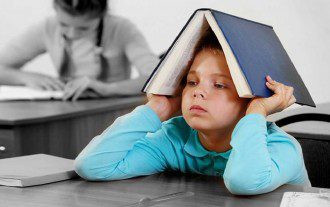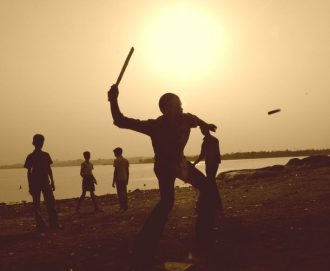Guest writer for Wake Up World
When my Dad was growing up he had one jumper each winter. One. Total.
He remembers how vigilantly he cared for his jumper. If the elbows got holes in them my Grandma patched them back together. If he lost his jumper he’d recount his steps to find it again. He guarded it like the precious gift it was.
He had everything he needed and not a lot more. The only rule was to be home by dinner time. My Grandma rarely knew exactly where her kids were. They were off building forts, making bows and arrows, collecting bruises and bloody knees and having the time of their lives. They were immersed in childhood.
But the world has moved on since then. We’ve become more sophisticated. And entered a unique period in which, rather than struggling to provide enough parents are unable to resist providing too much. In doing so, we’re unknowingly creating an environment in which mental health issues flourish.
[pro_ad_display_adzone id=”110028″]
When I read Kim John Payne’s book, Simplicity Parenting, one message leapt off the page: Normal personality quirks combined with the stress of “too much” can propel children into the realm of disorder. A child who is systematic may be pushed into obsessive behaviours. A dreamy child may lose the ability to focus.
Payne conducted a study in which he simplified the lives of children with attention deficit disorder (ADD). Within four short months 68% went from being clinically dysfunctional to clinically functional. The children also displayed a 37% increase in academic and cognitive aptitude, an effect not seen with commonly prescribed drugs like Ritalin.
As a new parent I find this both empowering and terrifying. We officially have a massive opportunity and responsibility to provide an environment in which our children can thrive physically, emotionally and mentally.
So, what are we getting wrong and how can we fix it?
The Burden of Too Much
Early in his career, Payne volunteered in refugee camps in Jakarta, where children were dealing with post-traumatic stress disorder. He describes them as, “jumpy, nervous, and hyper-vigilant, wary of anything novel or new.”
Years later Payne ran a private practice in England, where he recognized many affluent English children were displaying the same behavioural tendencies as the children living in war zones half a world away. Why would these children living perfectly safe lives show similar symptoms?
Payne explains that although they were physically safe, mentally they were also living in a war zone of sorts, “Privy to their parents’ fears, drives, ambitions, and the very fast pace of their lives, the children were busy trying to construct their own boundaries, their own level of safety in behaviours that weren’t ultimately helpful.”

Suffering with a “cumulative stress reaction” as a result of the snowballing effect of too much, children develop their own coping strategies to feel safe. Parents and society are conscious of the need to protect our children physically.
We legislate car seats, bike helmets and hover in playgrounds. But protecting mental health is more obscure.
Sadly, we are messing up. Modern day children are exposed to a constant flood of information which they can’t process or rationalise. They’re growing up faster as we put them into adult roles and increase our expectations of them. So, they look for other aspects of their life they can control.
The Four Pillars of Excess
Naturally as parents we want to provide our kids with the best start in life. If a little is good, we think more is better, or is it?
We enrol them in endless activities. Soccer. Music. Martial arts. Gymnastics. Ballet. We schedule play dates with precision. And we fill every space in their rooms with educational books, devices and toys. The average western child has in excess of 150 toys each and receives an additional 70 toys per year. With so much stuff children become blinded and overwhelmed with choice. They play superficially rather than becoming immersed deeply and lost in their wild imaginations.
Simplicity Parenting encourages parents to keep fewer toys so children can engage more deeply with the ones they have. Payne describes the four pillars of excess as having too much stuff, too many choices, too much information, and too much speed.
When children are overwhelmed they lose the precious down time they need to explore, reflect and release tension. Too many choices erodes happiness, robbing kids of the gift of boredom which encourages creativity and self-directed learning. And most importantly “too much” steals precious time.
Protecting Childhood
Similar to the anecdote of the heat slowly being turned up and boiling the unsuspecting frog, so too has society slowly chipped away at the unique wonder of childhood, redefining it and leaving our kid’s immature brains drowning trying to keep up. Many refer to this as a “war on childhood”.
[pro_ad_display_adzone id=”110030″]
Developmental Psychologist David Elkind reports kids have lost more than 12 hours of free time per week in the last two decades meaning the opportunity for free play is scarce. Even preschools and kindergartens have become more intellectually-oriented. And many schools have eliminated recess so children have more time to ‘learn’.
Spending time playing in organized sports is associated with significantly lower creativity in young adults, whereas spending time playing informal sports is related to significantly more creativity. It’s not the organized sports themselves that hamper creativity, but when time is not also spent on creative play, children lack important ‘down time’ from structured thinking. Even two hours per week of unstructured play boosted children’s creativity to above-average levels.
Parents Take Charge
So, how do we as parents protect our kids in this new “normal” society has created?
Simple, we say no. We protect our kids and say no, so we can create space for them to be kids. No, Sam can’t make the birthday party on Saturday. No, Sophie can’t make soccer practice this week.
And we recreate regular down time providing a sense of calm and solace in their otherwise chaotic worlds. It provides a release of tension children know they can rely on and allows children to recover and grow, serving a vital purpose in child development.
We filter unnecessary busyness and simplify their lives. We don’t talk about adult problems at the dinner table with a seven year old. We watch the news after our kids are asleep. We remove excessive toys and games from our toddler’s room when they’re sleeping. We recreate and honour childhood.
Our children have their whole lives to be adults and to deal with the complexities of life, but only a fleetingly short time in which they can be kids. Silly, fun loving kids.
Childhood serves a very real purpose. It’s not something to “get through”. It’s there to protect and develop young minds so they can grow into healthy and happy adults. When society messes too much with childhood, young brains react. By providing a sense of balance and actively protecting childhood we’re giving our children the greatest gift they’ll ever receive.
“One generation full of deeply loving parents would change the brain of the next generation, and with that, the world.” – Charles Raison
Simplifying Childhood
I am writing an eBook, ‘Simplifying Childhood: How Embracing the Simple Life Helps Nurture the Emotional Development of Your Child.’ Click here to learn more about it or sign up to be notified when it is available (coming soon!)
About the author:
I’m Tracy Gillett, a passionate writer, mother, global nomad and natural parenting advocate. I founded the natural parenting website Raised Good, a heart-driven platform to provide parents with sound, well thought out, scientifically backed advice. If you resonated with this article you may like to subscribe to my monthly newsletter and you’ll receive a free copy of my eBook Parenting by Nature which will help free you from the “rules” of modern parenting. Originally from Australia, I now live in Vancouver, Canada, with my husband and young son. You can also find me on Facebook, Twitter and Instagram, and RaisedGood.com.
A warm welcome for Wake Up World readers, from Tracy.
[pro_ad_display_adzone id=”110027″]








